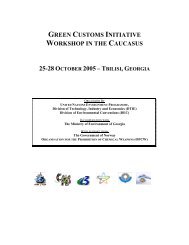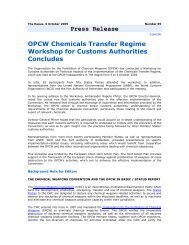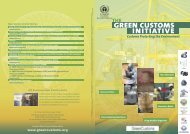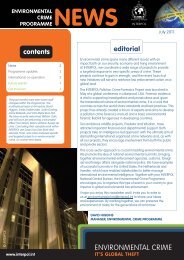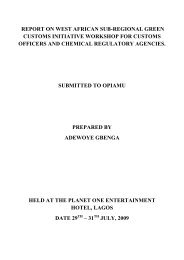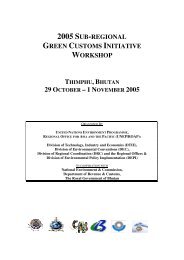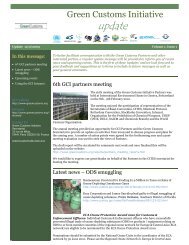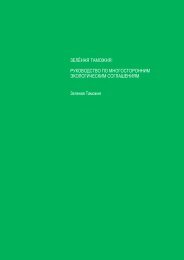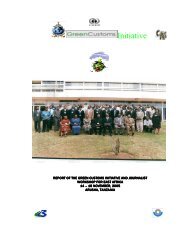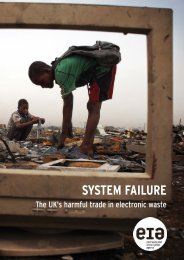Paris - Green Customs Initiative
Paris - Green Customs Initiative
Paris - Green Customs Initiative
- No tags were found...
You also want an ePaper? Increase the reach of your titles
YUMPU automatically turns print PDFs into web optimized ePapers that Google loves.
Meeting Report, 27 January 2005• Mr. Bruce Pasfield, Assistant Section Chief, Environment Crimes Section, USDepartment of Justice‣ OPCWMagda Bauta introduced OPCW’s activities and explained the tracking system ofchemical weapons implemented by OPCW, controlling imports and exports ofdangerous chemicals. OPCW has also recognised the necessity of adoptingappropriate legal trade regulation.OPCW has customs training programmes but finds it difficult to reach out to theconstituencies of customs and they would like to cooperate with UNEP DTIE whichspecifically works with customs officers. OPCW invited UNEP DTIE to participate inone of its technical meetings in Buenos Aires on 6-8 September 2004.A framework MOU between UNEP and OPCW is in progress (draft needs to beapproved by the Executive Council of the OPCW). Ms Bauta emphasised thenecessity of securing that this initiative is properly funded. OPCW itself isconsidering to commit some financial resources to the GCI.‣ OECDAngela Bularga presented the OECD work on environmental compliance assurancethat focuses mostly on non-member countries, in particular on environmentalinspectorates and their partners from Eastern Europe and Central Asia. Thisprogramme area aims at raising effectiveness and efficiency of environmentalenforcement authorities, and achieving higher regulatory compliance.Among others, capacity building activities for environmental inspectors areimplemented. These included the development of a “Glossary of EnvironmentalCompliance and Enforcement Terms” initially intended for environmental inspectors,but also distributed to other parties like NGOs, prosecutors and judges, etc.Recently, a “Toolkit for Environmental Inspectors” was published, which Ms Bulargaoffered to forward to the Partners is case of interest. Based on the Toolkit, trainingworkshops were conducted in Caucasus (with participation of inspectors fromArmenia, Azerbaijan and Georgia), Kazakhstan, and Russian Federation. The nexttraining is planned to happen in Kyrgyzstan in February 2005.The OECD representative underlined the need to create a sustainable mechanism oftraining, giving as example one especially successful project in Kazakhstan, wherethe training programme for inspectorates is delivered by a self-financing independenttraining centre.Ms Bularga also mentioned the EECCA Regulatory Environmental ProgrammeImplementation Network as a possible avenue for conveying the messages of theGCI.‣ INECEKen Markowitz explained that INECE is a partnership of prosecutors, civil lawyers,judges and parliamentarians and others, rather than an NGO. Its main aim is tofacilitate communication between different stakeholders and help organisations inthe area of environmental compliance and enforcement.INECE strikes for three main goals to combat illegal trade: awareness raising,building capacity and especially promoting networks. Mr. Markowitz highlighted theneed of raising awareness regarding the compliance with the rules of law to achievea mindset within the judiciary responsive to issues of international criminalenvironmental law. INECE’s web site includes links to specific MEAs and literature6



